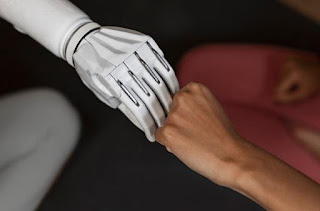Are you one of those worried about AI taking all the human jobs in science and tech, arts and humanities? Nah! there is need to worry less. AI is never a threat to human jobs in the world, it rather makes delivery of your work seamless, smart and faster only if you know exactly how to use AI to effect your work.
While advancements in artificial intelligence (AI) have the potential to automate many tasks and roles, there are certain jobs that are less likely to be fully replaced by AI. Here are some examples we wish to discuss for you.
1. Jobs Requiring Human Interaction and Empathy
Artificial Intelligence for now have no feelings and empathy, they are automated machines run by codes to automate task fasted than humans. Roles that involve deep human connection, such as counseling and therapy, customer service and support positions, social work, and community outreach, rely heavily on human empathy and understanding. Such kind of jobs can never be replace by AI because human will be preferable for doing the job.
2. Creative and Artistic Professions
Jobs that involve creativity, innovation, and artistic expression, such as writers, artists, musicians, and designers, require human imagination and emotional intelligence, which are difficult for AI to replicate. In writing, AI could write but without human feelings to express emotions, it will easily be detected and off point.
3. Complex Decision-making and Problem-solving Roles
AI are built to solve a lot of human problems ads safe a lot of time and resources in doing that. However, when it comes to solving complex task, humans are preferable. Jobs that involve strategic thinking, thought leadership, critical analysis, and complex decision-making, such as top-level executives, directors, managers, and CEOs, often require a deep understanding of business dynamics and human behavior.
4. Legal and Judicial Positions
Lawyers and judges play a crucial role in interpreting laws, analyzing complex legal cases, and making judgments based on legal principles and ethics. The complex nature of legal work makes it challenging for AI to fully replace these roles. For this type of jobs, humans are safe not to be replaced by AI.
5. Highly skilled Healthcare Professionals
Certain healthcare professions, such as surgeons, specialized physicians, and other medical practitioners, require a combination of technical expertise, experience, and human judgment. These roles involve complex decision-making and delicate procedures that are currently beyond the capabilities of AI. Some simple medical treatments can be deployed by AI but under the supervision of humans.
6. Research and Development
Jobs that involve scientific research, innovation, and development of new technologies often require creativity, critical thinking, and problem-solving skills that are difficult for AI to replicate.
It is important to note that while AI may not fully replace these jobs, it can still augment and assist professionals in these fields, improving efficiency and productivity. Additionally, the impact of AI on job roles can vary depending on the specific industry and technological advancements.
Conclusion
The impact of AI on the labor market has grown to be substantial discussion point because of the numerous buzzes and trends. As the Technology has the power to change and automate some tasks, it continues to have a complicated overall impact on employment. While AI might replace some workers, it also has the ability to expand on current roles and generate new ones. As AI technology develops, new positions will be created to create, implement, and keep AI systems running. Furthermore, there will be an increasing demand for experts in disciplines like data analysis, algorithm, machine learning, and ethics in AI.





No comments:
Post a Comment